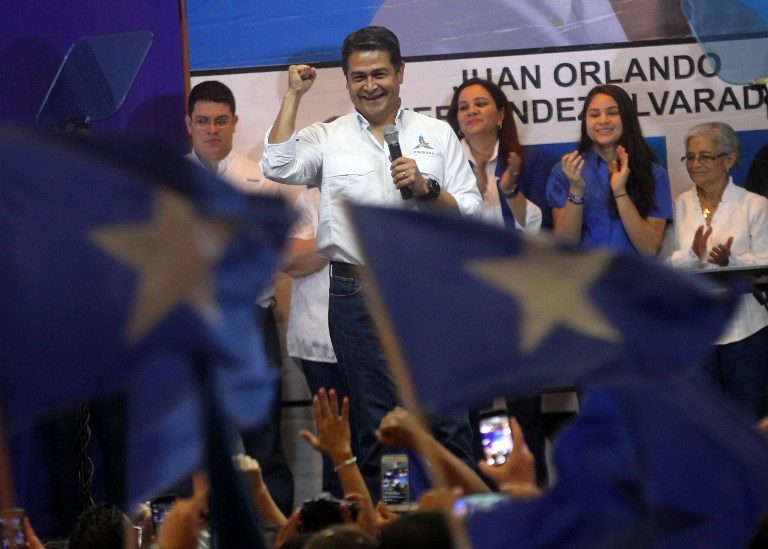SUMMARY
This is AI generated summarization, which may have errors. For context, always refer to the full article.

TEGUCIGALPA, Honduras – Juan Orlando Hernandez was sworn in as president of Honduras for a second term Saturday, January 27 amid protests that he fraudulently won the November election.
Hernandez took the oath at a special session of Congress at the National Stadium, with the bleachers packed with his supporters.
At the event, in which he vowed to “comply with and enforce the Constitution and law,” the 49-year-old Hernandez said he was “committed to developing a process of reconciliation among all Hondurans.”
Hernandez takes on his new mandate in the impoverished Central American country of nine million with diminished legitimacy due to the controversial election.
Supporters of defeated opposition candidate Salvador Nasralla accused him of setting up a “military dictatorship,” and insist that the election was stolen.
Hernandez stood for re-election against Nasralla despite a constitutional ban on presidents serving more than one term.
He narrowly won after a three-week stretch of often-interrupted ballot counting that sparked accusations of fraud. (READ: Hondurans protest ‘fraud’ as vote count rolls on)
The leftist opposition staged protests that shook the country throughout the week, culminating in a mass rally in Tegucigalpa late Friday.
On Saturday, however, protesters could get only within 500 meters of the inauguration event.
The stadium was protected by several rings soldiers and police, who were pressed into duty from around the country.
In the capital’s Miraflores neighborhood, protesters hurled rocks at a bus full of Hernandez supporters.
“The protests do not end today, this will be permanent,” Nasralla told reporters, as he called for new elections.
Police later deployed armored vehicles and fired tear gas at rock-throwing protesters.
About 10,000 protesters marched in Honduras’s second city of San Pedro Sula to show their opposition to Hernandez’s inauguration.
“The only way we can get this dictator out is to fight in the streets,” opposition lawmaker Samuel Madrid, who participated in the march, told Agence France-Presse.
Dozens of people have been killed and hundreds jailed since Hernandez was declared the winner of the November 26 runoff election.
‘No legitimacy’
“This is a government that has the seals of the state but has no legitimacy,” said rights activist Berta Oliva.
“It imposes its authority in a savage way with soldiers in the street,” she told AFP, describing the new government as a “dictatorship.”
Political scientist Juan Ramon Medrano has said that the Honduran government “is showing signs of dictatorship.” (READ: State of emergency in Honduras after post-vote violence)
“In Honduras, there is a political crisis” that the United States and the Organization of American States regional bloc “do not measure with the same yardstick as they measure Venezuela,” he said.
Washington and the OAS have been highly critical of Venezuela’s leftist regime.
Market analyst group Eurasia said the demonstrations “will likely diminish after Hernandez’s inauguration.”
“Still, Hernandez will begin his second term in a much weaker position given the social component, with his legitimacy in question,” it said in a note ahead of the inauguration.
The OAS had proposed holding new elections after its observer mission expressed doubts about the outcome.
However, it recently said it intends to “work in the future with the elected authorities of Honduras.”
Hernandez has implicit backing from the United States, which is pouring millions of dollars into Honduras and neighboring Guatemala and El Salvador to help improve security.
The three countries, collectively known as Central America’s “Northern Triangle,” are a significant source of undocumented migrants heading to the United States, and are also key in the fight against drug trafficking. – Rappler.com
Add a comment
How does this make you feel?
There are no comments yet. Add your comment to start the conversation.